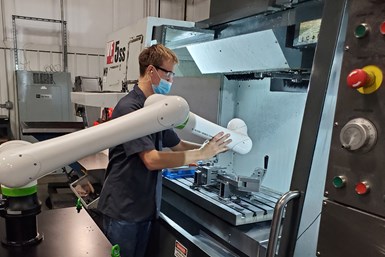Acieta’s Mobile Collaborative Robot Increases Shop Capacity
FastLoad CX1000 is a simple to use, flexible cobot that can be outfitted with up to three modular carts to handle a wide variety of parts or allow more parts in the queue.

Acieta’s FastLoad CX1000
Acieta’s FastLoad CX1000 collaborative expandable robotic cell is a simple-to-use, flexible cobot solution that enables operators to work safely beside the robot as it loads and unload parts on up to two machines, thus doubling throughput. Force sensors stop the robot when pressure is applied, ensuring a safer application for the operator.
To prevent shop equipment from sitting idle, the FastLoad CX1000 is mounted on a mobile platform that one worker can move easily so it can be quickly set up at different machines around the shop. The system is equipped with a FANUC 10-kg, 120-V collaborative robotic arm and can be outfitted with up to three modular carts to handle a wide variety of parts or allow more parts in the queue.
An intuitive touchscreen interface is said to make programming very simple. Setup takes only hours, not days. The cobot also has a small footprint and doesn’t require safety fencing, so it takes up approximately 80% less floor space than a traditional robotic cell.
According to the company, the FastLoad CX1000 is pre-engineered to meet the most common machine tooling needs so it can be ready for delivery and installation within one week. Giving repetitive tasks to robots enables employers to reallocate skilled workers into more challenging and valuable jobs such as quality control and parts design.
Related Content
-
The Advantages of Automated Shopfloor Gaging
This “parallel kinematic” gage offers the opportunity to automate and improve machining process control for shops endeavoring to move from sample inspection to 100% inspection.
-
Inside the Premium Machine Shop Making Fasteners
AMPG can’t help but take risks — its management doesn’t know how to run machines. But these risks have enabled it to become a runaway success in its market.
-
Increased Competition Calls for Smarter Solutions
Engineered for efficiency, SW Machines offers customers a full suite of horizontal machining centers and the automation needed for high-volume, high-precision manufacturing.












